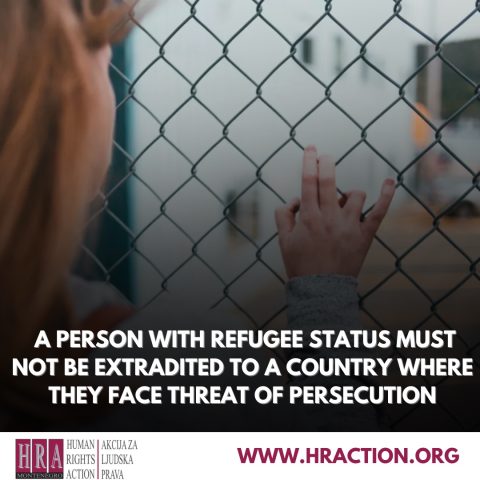- HRA kontakt
- Tel: +382 20 232 348
- hra@t-com.me
A PERSON WITH REFUGEE STATUS MUST NOT BE EXTRADITED TO A COUNTRY WHERE THEY FACE THREAT OF PERSECUTION

JAKŠIĆ STOJANOVIĆ SHOULD REMAIN AS MINISTER OF EDUCATION
12/07/2024A PERSON WITH REFUGEE STATUS MUST NOT BE EXTRADITED TO A COUNTRY WHERE THEY FACE THREAT OF PERSECUTION

A Russian citizen of Ukrainian origin Inga Pelinyagra, who has been granted refugee status by Italy, was arrested three days ago in Montenegro on a warrant from Moscow. She is currently in extradition custody.
Ms. Pelinyagri was granted political refugee status in Italy due to her public statements and political opinions against the regime in Russia. The Italian authorities determined that she would be subjected to political persecution in Russia for these views, which would endanger her life or freedom.
Montenegro is obligated by the 1951 Refugee Convention and the 1967 Protocol to provide protection to individuals recognized as refugees by a contracting state, such as Italy, as this form of protection is international, not domestic (Italian). Consequently, the protection from persecution that Ms. Pelinyagri received in Italy is also valid on the territory of Montenegro. Specifically, Article 33 of the Convention prohibits Montenegro from expelling or forcibly returning Ms. Pelinyagrito a territory where her life or freedom would be threatened because of her race, religion, nationality, membership of a particular social group, or political opinion. Additionally, the risks she would face include treatment contrary to Article 3 of the European Convention on Human Rights and Fundamental Freedoms, as well as Article 3 of the UN Convention Against Torture and Other Cruel, Inhuman or Degrading Treatment or Punishment.
The Human Rights Action warns that by extraditing this person to Russia, Montenegro would violate its international obligations and the human rights of Ms. Pelinyagri, which protect her from persecution and suffering serious injustice. The fact that she is detained itself is already an arbitrary practice that ignores her refugee legal status.
Lawyer Dalibor Tomović filed an appeal today with the Higher Court in Podgorica against the decision to place Ms. Pelinyagriin in extradition custody. He also added that the detention decision does not contain detailed reasons for why and based on what specific evidence the Court determined that the accused is reasonably suspected of committing the crime she is charged with in Russia. The challenged decision does not even contain general reasons regarding the actions she is accused of, which makes it illegal and contrary to the Constitution of Montenegro and the European Convention on Human Rights. According to the Higher Court, reasonable suspicion arises only from the content of the international warrant, and the risk of flight stems from her Russian citizenship. Such reasons represent standard formulations by which detention, in terms of Article 5 of the European Convention, is considered arbitrary.
Montenegro’s extradition authorities, including the Higher Court in Podgorica, are obliged to directly apply absolute norms of international customary law, including the norm guaranteeing the principle of non-refoulement. Therefore, they must consider all individual and general circumstances indicating political persecution, arbitrary detention, politically motivated judicial proceedings, inhumane and degrading prison conditions in Russia, and other risks of mistreatment and threats to her life. A relevant fact in Ms. Pelinyagri’s case is her ethnic background and her public criticism of the Russian authorities, which were the reason for her persecution. By extraditing her, Montenegro would endorse the practice of systematic violations of the right to freedom of expression, reflected in the persecution of dissidents who disagree with the official policies of the Russian authorities and who, as a result, are prosecuted, imprisoned, or killed.
Legal assistance to Inga Pelinyagra in this proceeding is provided by the Human Rights Action.







 English
English